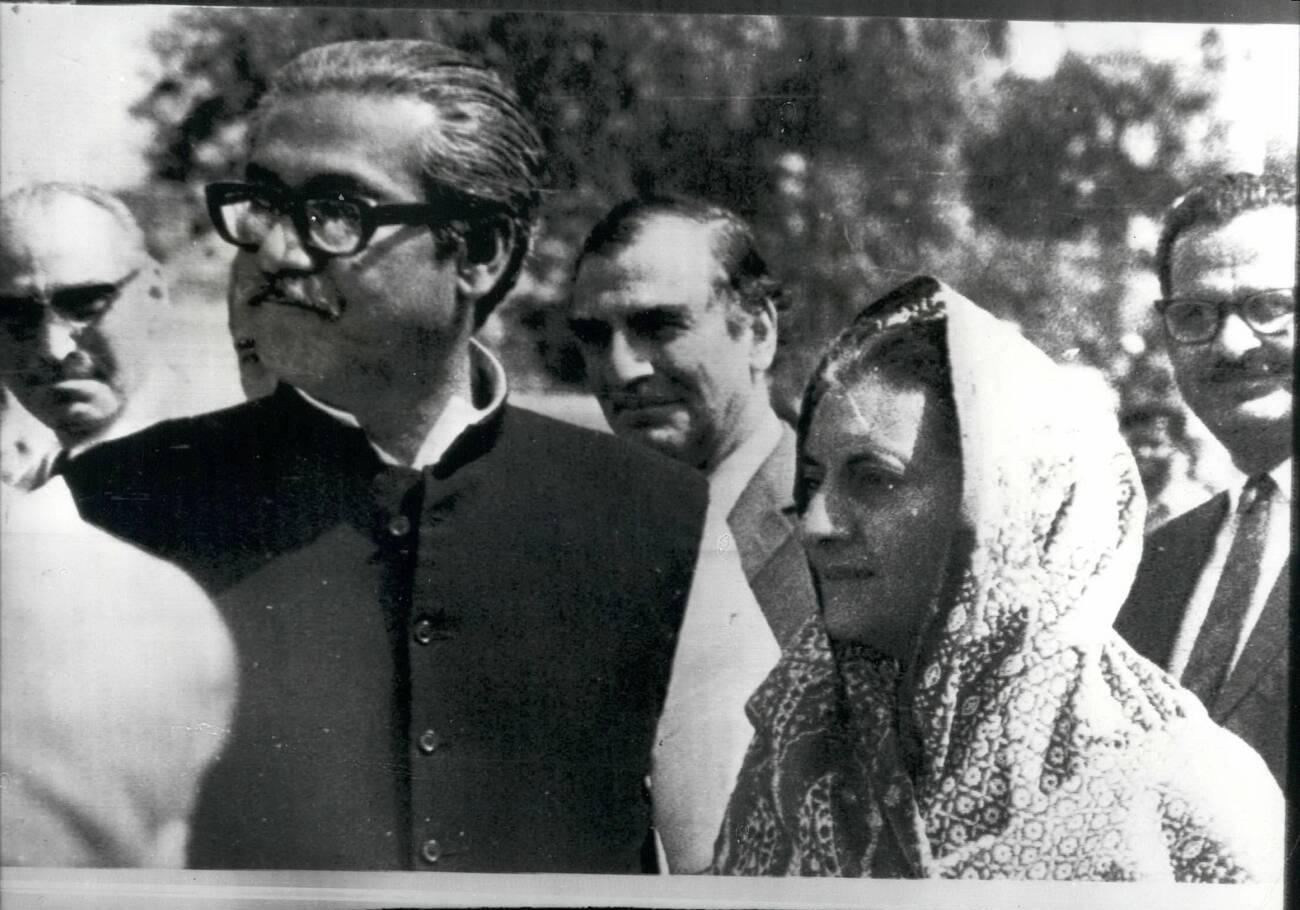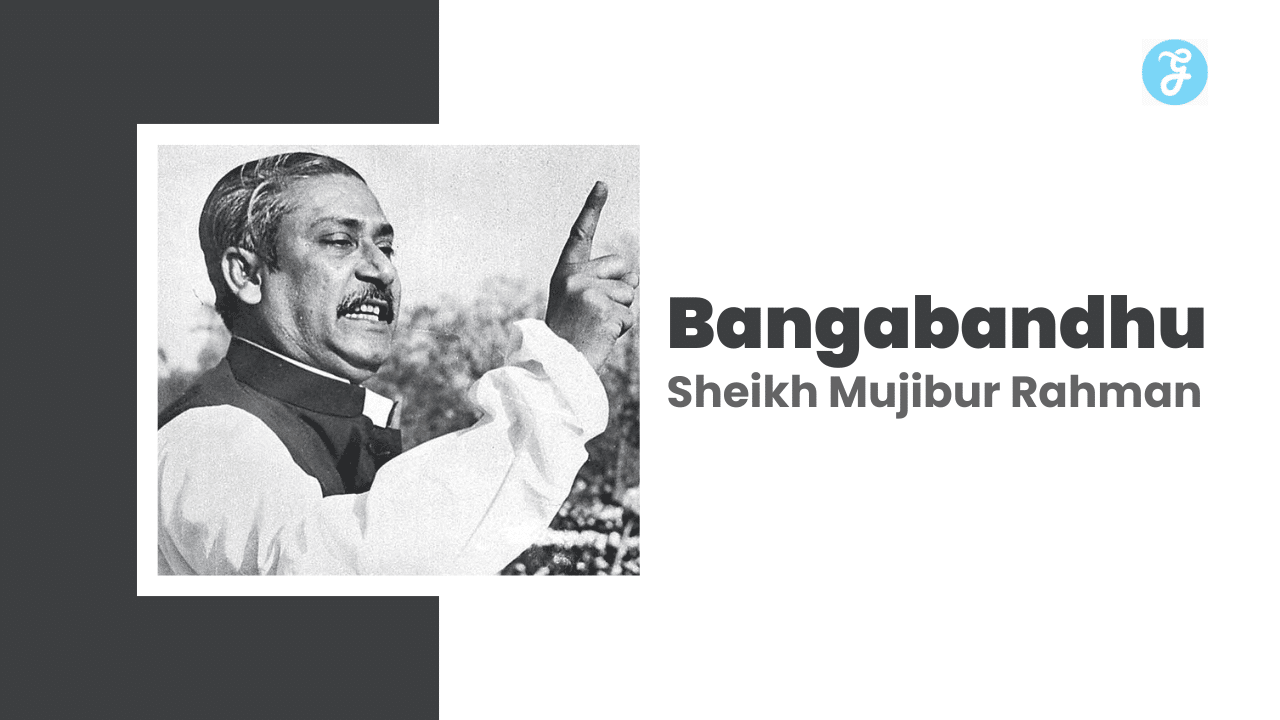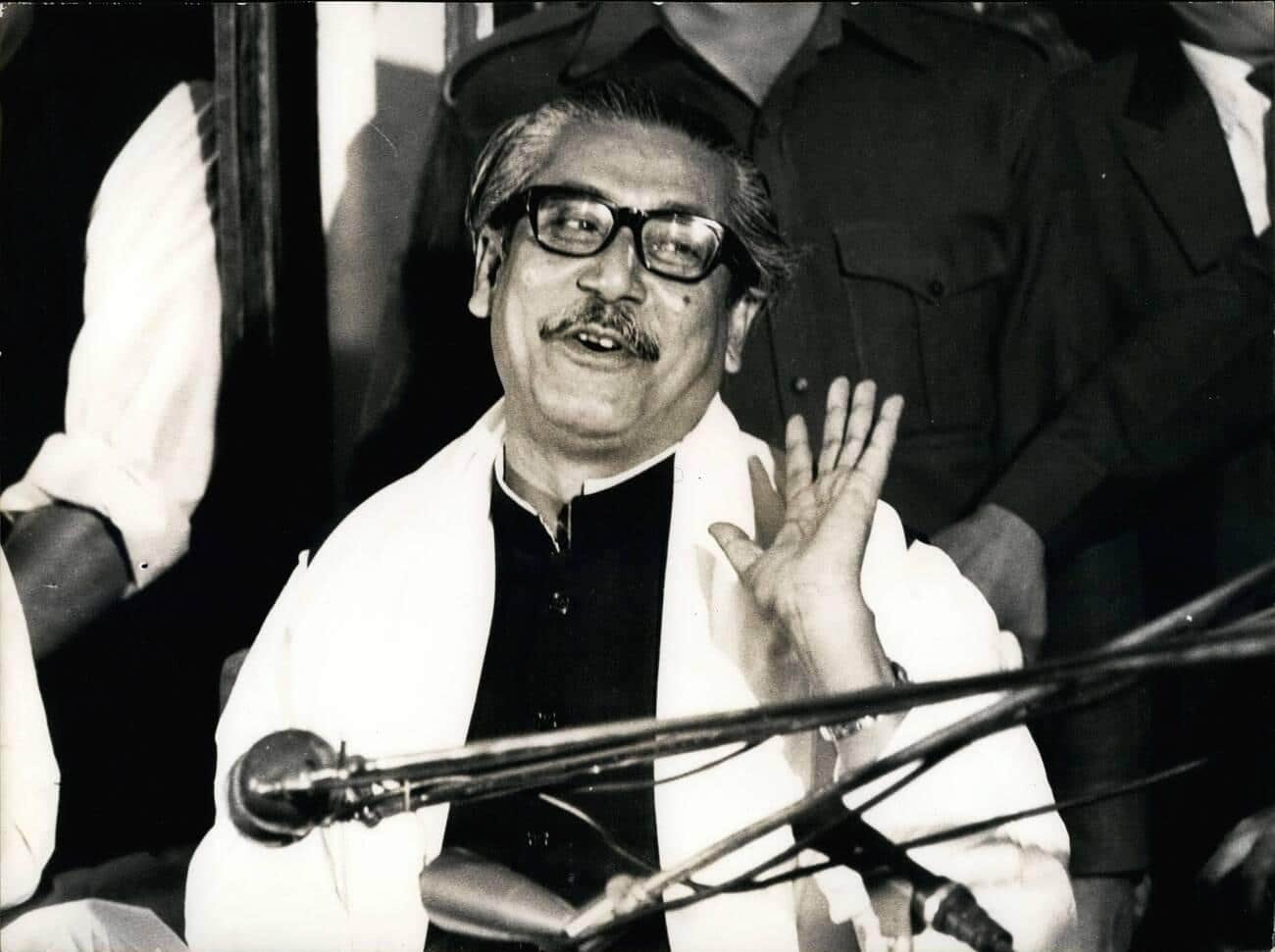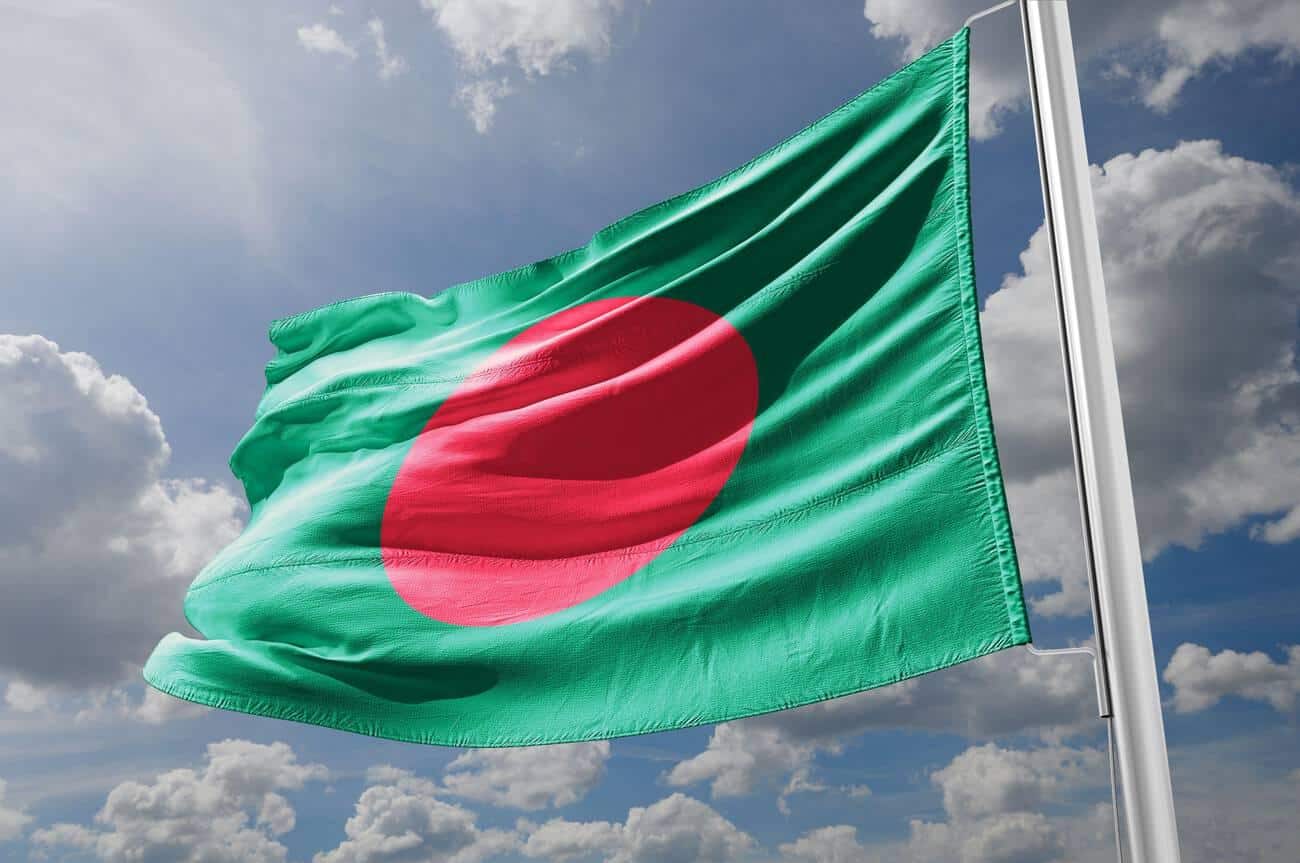Bangabandhu Sheikh Mujibur Rahman, often revered as the ‘Father of the Nation’ in Bangladesh, stands as a colossal figure in the annals of South Asian history. Bangabandhu is the architect of independent Bangladesh. Beyond his political prowess, Bangabandhu, a title which translates to “Friend of Bengal,” embodied the aspirations of millions, striving to build a nation rooted in democracy, secularism, and social justice.
This article deepens his life and leadership, comprehensively understanding his significant contribution to Bangladesh’s freedom.
Let’s uncover the fascinating journey that made him the heartbeat of a nation!
Content Highlights
- Sheikh Mujibur Rahman, also known as Bangabandhu, played a significant role in the language movement and founding of the Awami League.
- He led the Six – point movement for more independence for East Pakistan and faced oppression during the Agartala Conspiracy Case.
- Sheikh Mujibur Rahman’s leadership led to Bangladesh’s establishment as an independent nation after winning the 1970 election and leading civil disobedience movements and war against West Pakistan.
- His governance prioritized economic policies, secularism, foreign policy, addressing left-wing insurgency, and implementing a one-party state.
Early Life and Activism of Bangabandhu Sheikh Mujibur Rahman
Sheikh Mujibur Rahman fondly remembered as “Bangabandhu” or “Friend of Bengal”, was born on March 17, 1920, in Tungipara, a small village in the Gopalganj district of Bengal (present-day Bangladesh). The tumultuous era in which he grew up deeply influenced his political awakening. From a young age, he exhibited a genuine desire to advocate for the rights of Bengalis. His foray into politics began at school, becoming more pronounced during his college years in Kolkata, where he joined the All India Muslim Students Federation.
The 1943 Bengal Famine was a pivotal event that shook young Mujib, cementing his resolve to fight for the rights and welfare of his people. His activism continued to gain momentum after the partition of India in 1947, with East Bengal becoming East Pakistan. Opposed to the West Pakistani rulers’ political and economic marginalization of Bengalis, Rahman became a prominent advocate for the linguistic and cultural rights of Bengalis.
His leadership in the 1952 Language Movement, which aimed to make Bengali one of the official languages of Pakistan, was a testament to his deep-rooted commitment to his people’s identity and rights. As he evolved into a political stalwart, his vision expanded from regional issues to imagining an independent and sovereign nation for Bengalis, ultimately leading to the liberation movement of Bangladesh in 1971.
Throughout his early life and activism, Bangabandhu’s unwavering dedication and love for his homeland and its people made him an iconic figure in South Asian history.
Family
Sheikh Mujibur Rahman was married to Sheikh Fazilatunnesa (Renu). Together, they had two daughters and three sons. Their daughters are Sheikh Hasina and Sheikh Rehana. Their sons are Sheikh Kamal, Sheikh Jamal, and Sheikh Russell.
It’s important to note that Sheikh Mujibur Rahman came from the Bengali Muslim aristocratic Sheikh family.
Sheikh Mujibur Rahman and Huseyn Shaheed Suhrawardi
Bangabandhu Sheikh Mujibur Rahman, the founding father of Bangladesh, and Huseyn Shaheed Suhrawardy, a prominent political leader in British India and later Pakistan, share a significant chapter in the annals of South Asian history. In his early political life, Mujibur Rahman was deeply influenced by Suhrawardy, a key advocate for the rights of Bengalis, and played a pivotal role in the creation of Pakistan.
Although unfulfilled, Suhrawardy’s vision of a united Bengal, free from India and Pakistan, inspired many, including the young Mujib. The mentorship and association between the two became even more pronounced during their involvement in the Awami Muslim League, which later became the Awami League.
Mujibur Rahman admired Suhrawardy’s commitment to democracy and secular and inclusive politics. Although their paths diverged as Mujib championed the cause for Bangladesh’s independence from Pakistan, the foundational principles and political ethos that Suhrawardy instilled played a role in shaping Mujib’s vision for a sovereign Bangladesh.
Founding of the Awami League
Sheikh Mujibur Rahman helped start the Awami League. He was one of the first joint secretaries. The party’s four main ideas are nationalism, socialism, democracy, and having no religion in politics.
The people gave it a lot of votes in East Pakistan. This made Sheikh Mujibur Rahman become a big leader there. Many people call him “Bangabandhu.” A foreign paper gave him this name.
Leadership in Pakistan
Sheikh Mujibur Rahman demonstrated his leadership skills in Pakistan through his involvement in various movements and conspiracies.
| Year | Milestone |
|---|---|
| 1920 | Born on March 17th in Tungipara, Gopalganj district, Bengal Presidency, British India. |
| 1943 | Joined the All India Muslim Students Federation. |
| 1947 | Became general secretary of the East Pakistan Awami Muslim League. |
| 1952 | Played a pivotal role in the Language Movement against the imposition of Urdu by the Pakistani government. |
| 1966 | Proposed the Six-Point Movement for greater autonomy for East Pakistan. |
| 1968-1969 | Faced charges in the Agartala Conspiracy Case but was released following mass protests. |
| 1970 | Led the Awami League to a landslide victory in the general elections. |
| 1971 | Declared Bangladesh’s independence on March 26, leading to the Bangladesh Liberation War. |
| 1972 | Became the Prime Minister of Bangladesh after its liberation. |
| 1975 | Became the President of Bangladesh. |
| 1975 | Introduced the Bangladesh Krishak Sramik Awami League (BAKSAL). |
| August 1975 | He and most of his family were assassinated in a military coup. |
Table: Important Years of Bangabandhu Sheikh Mujibur Rahman’s Life
Six-point Movement
Sheikh Mujibur Rahman led the Six-point Movement, which called for more independence for East Pakistan. The ruling government saw it as a way to break away from Pakistan. General Ayub Khan, who was in charge of Pakistan’s military, responded with harsh actions.
The six-point demand is considered a crucial part of Bangladesh’s fight for freedom and is also known as the “charter of freedom.”
Related Read: The History of International Mother Language Day
Agartala Conspiracy Case
The Agartala Conspiracy Case was a sedition case filed in early 1968 against Sheikh Mujibur Rahman and others. The government accused them of conspiring with India to destabilize Pakistan.
They wanted people to think that Sheikh Mujibur Rahman was trying to separate East Pakistan from the rest of the country and that he was working for the Indians. But, due to pressure from both West and East Pakistan, the case was withdrawn on February 22, 1968, and all the accused were released.
The Governor of East Pakistan played an important role in convincing Ayub Khan that this case would be an opportunity to implicate Bangabandhu (Sheikh Mujibur Rahman).
1969 Uprising and Round Table Conference
Sheikh Mujibur Rahman led the 1969 uprising against President Muhammad Ayub Khan. The uprising began in response to Ayub Khan’s authoritarian rule and student unrest in 1968. The Mass Upsurge of 1969 played a significant role in the independence struggle of Bengalis. It marked the end of Ayub Khan’s “guided democracy” and Pakistani control in East Pakistan.
Following the uprising, a Round Table Conference was held in Islamabad. This conference showcased Sheikh Mujibur Rahman’s unwavering leadership and solidified his position as the architect of Bangladesh.
Journey Towards Independence
Sheikh Mujibur Rahman was pivotal in leading Bangladesh towards independence from Pakistan through the 1970 election, civil disobedience movements, and the outbreak of war.
His journey is a testament to his unwavering determination and the indomitable spirit of the Bangladeshi people. Read on to learn more about this extraordinary chapter in history.
1970 National Election
In the 1970 election, Sheikh Mujibur Rahman’s Awami League won in East Pakistan. This was a big deal because it showed that the people of East Pakistan wanted change and independence from West Pakistan.
The election results were not accepted by West Pakistan, which led to protests and even more tension between the two regions. After winning the election, Sheikh Mujibur Rahman became an even stronger advocate for independence, believing it was what the people wanted.
Establishment of Bangladesh
Sheikh Mujibur Rahman played a crucial role in the establishment of Bangladesh. After winning a landslide victory in the 1970 election, he led the country towards independence. The Pakistani government refused to hand over power to him, which led to widespread civil disobedience and protests throughout East Pakistan.
In response, West Pakistan launched a military crackdown on March 25, 1971.
This sparked a nine-month-long war between East Pakistan and West Pakistan. On December 16, 1971, Bangladesh emerged as an independent nation after defeating the Pakistani forces.
Civil Disobedience
During the journey toward independence, Sheikh Mujibur Rahman played a crucial role in leading the civil disobedience movement. It was a response to the government’s rejection of the election results 1970.
Bangabandhu believed in finding a bloodless, peaceful, and democratic solution for independence. The civil disobedience movement culminated in the proclamation of Bangladesh’s independence on March 26th.
Outbreak of War
The outbreak of war was a significant turning point in Bangladesh’s journey towards independence. In 1971, the Pakistani military launched a brutal crackdown on the Bengali population, leading to widespread violence and human rights abuses.
Sheikh Mujibur Rahman played a crucial role as the chief pilot of the liberation war, rallying support from the international community and organizing resistance forces. The Mukti Bahini, along with the Indian Armed Forces, joined forces and fought against Pakistan.
Their combined efforts led to a decisive victory for Bangladesh, resulting in its establishment as an independent nation. Sadly, this period was marred by tragedy when Sheikh Mujibur Rahman and 13 family members were tragically killed in 1975.
Homecoming
On January 10, we observed the Homecoming Day of Bangabandhu Sheikh Mujibur Rahman. After spending nine and a half months in a Pakistani jail, he returned to Bangladesh. This historic day is celebrated to honor the greatest Bangalee of all time.
Under his strong leadership, Bangladesh gained independence on December 16, 1971. However, the Pakistani government arrested and detained Sheikh Mujibur Rahman before that.
Leadership in Bangladesh
Sheikh Mujibur Rahman’s leadership in Bangladesh was marked by his effective governance and progressive economic policies. He prioritized secularism and pursued a balanced foreign policy.
He also addressed the left-wing insurgency and implemented a one-party state. To learn more about his leadership, continue reading.
Achievements As a President of the Newly Formed Bangladesh
Bangabandhu Sheikh Mujibur Rahman’s tenure as the President of Bangladesh was marked by several key initiatives and decisions to set a strong foundation for the newly liberated nation. Here’s a list of some of his notable works:
-
Drafting the Constitution: Under his leadership, Bangladesh’s Constitution was framed and adopted in 1972. It laid the foundational principles of democracy, secularism, socialism, and nationalism for the country.
-
Land Reforms: Mujibur Rahman initiated land reforms to eliminate the feudal zamindari system. The goal was to distribute land to the landless peasants, creating an equitable society.
-
Rehabilitation of Refugees: Post-independence, Bangladesh faced the immense challenge of rehabilitating millions of refugees who had fled during the war. Mujibur Rahman took steps to ensure their proper resettlement and integration into Bangladeshi society.
-
Nationalization: In an attempt to rebuild the economy, many sectors, including banks, industries, and insurance companies, were nationalized under his leadership.
-
Establishing Bangladesh Betar: He transformed the radio broadcasting service into Bangladesh Betar to boost communication and spread national messages.
-
Foreign Policy Initiatives: He emphasized a non-aligned and independent foreign policy for Bangladesh and fostered relationships with neighboring countries and other global nations.
-
Promotion of Bengali Culture: As a staunch advocate for the Bengali identity, Mujibur Rahman took steps to promote and protect the rich cultural heritage, language, and traditions of the Bengali people in the new nation.
-
Initiation of Economic Plans: To rebuild the war-torn economy, his government initiated the First Five-Year Plan (1973-1978) focused on sectors like agriculture, rural development, and infrastructure.
-
Establishing the Bangladesh Civil Service: To ensure efficient governance and administration, the Bangladesh Civil Service (BCS) was created under his presidency.
Governance and Economic Policies
Bangabandhu Sheikh Mujibur Rahman’s governance and economic policies were focused on creating a fair and inclusive society. He believed in establishing a democratic state with a just and equitable social order.
His priority was the welfare of the people, and he worked hard to reduce poverty and inequality. Sheikh Mujibur Rahman implemented various measures to promote economic growth and development.
He placed special emphasis on improving the agricultural sector and boosting industrialization. His vision was to build a prosperous nation where every citizen could benefit from the country’s progress.
Secularism
Sheikh Mujibur Rahman strongly believed in secularism and advocated for it in Bangladesh. His vision for the country emphasized embracing cultural identity, language, and traditions without religious restrictions.
Secularism was a guiding principle of his leadership, along with nationalism, democracy, and socialism. He was committed to creating a secular republic where people could practice their religions freely.
Bangabandhu’s commitment to secularism was recognized and valued by other countries, including India.
Foreign Policy

Bangabandhu Sheikh Mujibur Rahman played a pivotal role in shaping the foreign policy of Bangladesh. He was known as the architect of Bangladesh’s foreign policy. One important fact is that he addressed the UN General Assembly on September 25th to share Bangladesh’s perspective with the world.
His dynamic leadership and vision have significantly impacted how Bangladesh conducts its international relations today. Under the current leadership of Prime Minister Sheikh Hasina, his daughter, Bangladesh continues to prioritize diplomacy and engagement with other nations to enhance its standing in the global arena.
Bangabandhu Sheikh Mujibur Rahman’s contributions to foreign policy are widely recognized, and they continue to shape and guide Bangladesh’s approach toward establishing fruitful relationships with other countries.
Addressing the Left-Wing Insurgency
Sheikh Mujibur Rahman faced a significant challenge as Prime Minister of Bangladesh – the left-wing insurgency. This insurgency took place between 1972 and 1975 after the country gained independence.
Communist insurgents led this movement, opposing Sheikh Mujibur Rahman’s government. Despite facing opposition, Sheikh Mujibur Rahman implemented various measures to address this insurgency and maintain stability in the country.
His administration took steps to counter the influence of left-wing groups and ensure national security. The insurgency was eventually controlled through strong leadership and strategic actions by Sheikh Mujibur Rahman’s government.
Assassination and Aftermath
Sheikh Mujibur Rahman and most of his family were assassinated on August 15, 1975. This shocking event sent shockwaves through the nation and led to political instability in Bangladesh.
The assassination of Sheikh Mujibur Rahman
Sheikh Mujibur Rahman, the beloved leader of Bangladesh, faced a tragic end on August 15, 1975. In the early hours of that day, he was assassinated along with his family by a group of young army individuals.
This heartbreaking event occurred after Bangladesh gained independence in December 1971, and Sheikh Mujibur Rahman returned to lead his nation in January 1972. The loss of this visionary leader left the entire country in shock and mourning.
Funeral and Legacy
Sheikh Mujibur Rahman’s funeral was solemn and grief-stricken as the nation mourned their beloved leader’s loss. Bangladesh came to a standstill as people from all walks of life paid their respects and bid farewell to the Father of the Nation.
The Bangabandhu Memorial Museum, his former residence, is a significant historical landmark that preserves his memory and contributions to the country. Although his assassination marked a dark chapter in Bangladesh’s history, Sheikh Mujibur Rahman’s legacy continues to shine as a beacon of hope and inspiration for the nation.
His ideals and vision for an independent Bangladesh continue to inspire generations, driving them toward building a better future for themselves and their country.
Portrayals in Media
Sheikh Mujibur Rahman has been portrayed in various forms of media, including songs, books, and films that highlight his leadership and legacy.
Songs
Songs play a significant role in portraying the life and legacy of Sheikh Mujibur Rahman. They serve as a medium to celebrate his contributions and inspire the nation. Here are some notable songs associated with Bangabandhu:
- “Amra Chirodin Tomar Ache” (We are Forever Yours): This song highlights the unwavering loyalty and love of the people towards Sheikh Mujibur Rahman.
- “Shono Ekti Mujiborer Theke” (Listen to a Voice Like Mujib’s): This song praises Bangabandhu’s leadership, sacrifices, and vision for an independent Bangladesh.
- “Banglar Joy” (The Victory of Bengal): This patriotic song commemorates Bangladesh’s liberation war under Sheik Mujibur Rahman’s guidance.
- “Amar Bhaiyer Rakte Rangano Ekushe February” (21st February Dyed in My Brother’s Blood): This emotional song pays tribute to the Language Movement martyrs, which Bangabandhu actively participated in.
- “Rokto Diye Naam Likhechi” (I Have Written Your Name with Blood): This powerful song reflects the indomitable spirit and determination displayed by Sheikh Mujibur Rahman during his political journey.
- “Mujib Pardeshi Jano Re” (Foreigners, Know About Mujib): This song spreads awareness about Bangabandhu’s global influence and recognition as a visionary leader.
Books
Sheikh Mujibur Rahman’s life has been the subject of various books, which shed light on his leadership and influence. These books provide an in-depth understanding of his journey toward independence and governance in Bangladesh. Here are some notable books about Sheikh Mujibur Rahman:
- “The Unfinished Memoirs”: Sheikh Mujibur Rahman wrote this autobiography, giving a personal account of his life and political career.
- “Mujib”: This graphic novel presents the life of Sheikh Mujibur Rahman in a comic format, making it accessible to readers of all ages.
- “Inside Prison, inside the Mind of Mujibur Rahman”: This book explores Sheikh Mujibur Rahman’s experiences during prison, offering insights into his thoughts and resilience.
- “A Brief History of Bangabandhu Sheikh Mujibur Memorial Museum”: This book provides a concise history of the memorial museum dedicated to Sheikh Mujibur Rahman, allowing readers to delve into the significance of preserving his legacy.
- “Secret Documents of Intelligence Branch (IB) on Sheikh Mujibur Rahman”: This compilation features classified documents from Pakistan’s Intelligence Branch, shedding light on their surveillance and assessments regarding Sheikh Mujibur Rahman.
- “Speeches of Bangabandhu Sheikh Mujibur Rahman”: Containing 25 speeches delivered by him, this book showcases his powerful oratory skills and their impact on shaping Bangladesh’s history.






































